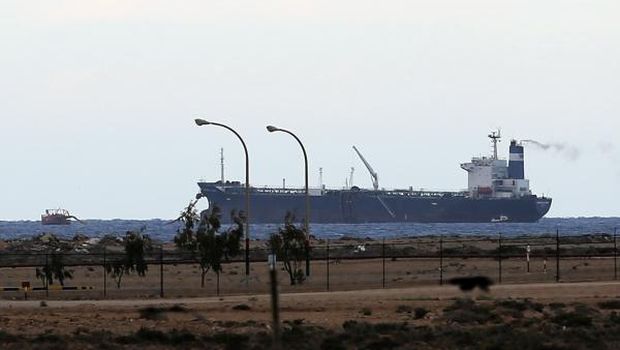
The North Korean-flagged tanker, Morning Glory, is docked at the Sidra export terminal in Ras Lanuf, eastern Libya, on March 8, 2014. (Reuters/Esam Omran Al-Fetori)
Cairo, Asharq Al-Awsat—Libya’s interim Prime Minister Ali Zeidan threatened to bomb a North-Korea flagged oil tanker if it ships oil from a port controlled by armed militias outside government control on Sunday.
The ship is docked in the port of Sidra, which is one of three oil terminals in eastern Libya held since August by militias demanding more regional autonomy and a greater share of national oil revenues.
Latest press reports say the Libyan military and militias aligned with the government have sent boats to the port to prevent the tanker sailing with its cargo.
This comes ahead of a decisive meeting to be held by the Libyan General National Congress (GNC) on Sunday to decide the fate of the transitional government, led by Zeidan.
A spokesman for the protesters, speaking on condition of anonymity, said: “We have started to export oil, and this is our first shipment.”
A military source, speaking on condition of anonymity, said: “The Libyan air force and navy are on standby to destroy the tanker, which has violated Libyan sovereignty and entered its territorial waters, if it does not leave the port within the deadline.”
Spokesperson for the Libyan naval forces, Ayoub Qasim, said the tanker, named the Morning Glory, approached the port three days ago but left after failing to dock. It then returned and docked on Saturday morning.
The current situation is a serious escalation of the siege of oil ports, which has led to a drop in vital Libyan oil exports.
Omar Shakmak, minister in charge of oil and gas, said the Defense Ministry was responsible for the protection of oil ports. He added: “Procedures followed with regards to tankers which try to smuggle oil are set by the Ministry of Defense, and our role as the Ministry of Oil is limited to exploration, production, implementing projects and bringing in revenue, but we do not take part in any military capacity.”
In the meantime, Asharq Al-Awsat has learned that the list of candidates to replace Zeidan has been reduced to two: the head of the Civil Status Department, Dr. Mohamed Boukar, and former head of the Integrity and Transparency Commission, Dr. Omar Al-Hbasi.
The GNC will hold a meeting in Tripoli on Sunday to hold a “direct vote to withdraw confidence in the current government and give it to a new prime minister.”
Members of the GNC, the highest political and constitutional authority in the country, said “there was recently a preliminary agreement among political parties in the GNC to choose between Boukar and Hbasi to replace Zeidan, who is expected to be voted out by the GNC.”
Despite some parties considering Nouri Al-Abar, who recently resigned his post as head of the Higher National Elections Commission (HNEC), as a strong candidate to replace Zeidan, he recently denied that his resignation had anything to do with the prime minister’s position.
However, the task of Zeidan’s enemies—who are hoping to topple him from the position he occupied since November 2012—is not easy, because according to the regulations of the GNC, 120 members out of the total of 200, must vote in favor in order for the prime minister to be dismissed.
